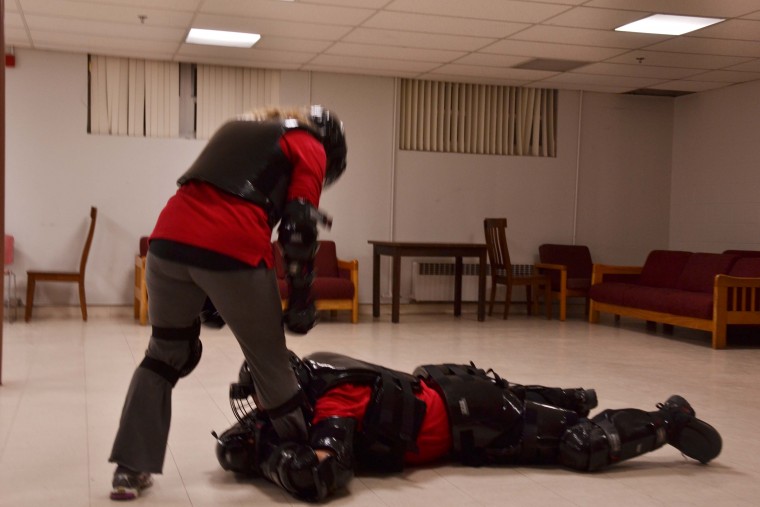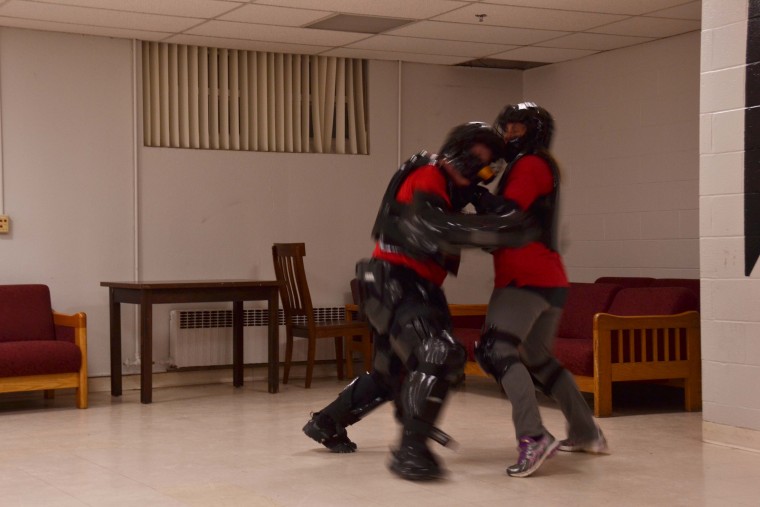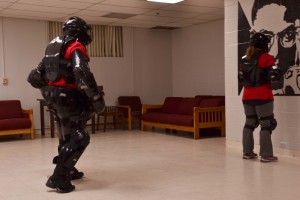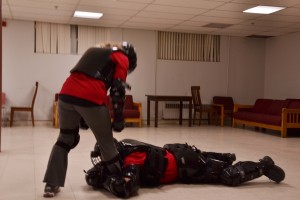Public Safety Holds Rape Aggression Defense Training for Staff


The meeting ran much later into the evening than usual, and you are walking back to your car alone. The parking lot is both dark and deserted. Suddenly a figure steps out of the shadows not five feet in front of you. What do you do?
Thanks to a special training course on campus, a dozen members of the Wesleyan community have a new set of skills to use in both assessing and responding to threatening situations like the one described above.

Rape Aggression Defense—or RAD—training, was recently offered to the university’s female staff members, coordinated by Krystal-Gayle O’Neill, a residential life area coordinator. Lieutenant Jay Mantie was the lead trainer, assisted by Sergeant Kathy Burdick. Officer Melissa Widlack is also a RAD trainer and works with the team. The three earned RAD training credential by passing an intensive four-day training course on the core fundamentals of RAD training.
“There was a physical component and a mental component to the training,” Mantie said. “We were given a tough and comprehensive test at the end to ensure we knew the material well.”
It’s clear that he, Burdick, and Widlack passed the week-long intensive with flying colors. While Mantie explains RAD through its mission statement (“The goal of RAD is to develop and enhance the options of self defense, so they may become viable considerations to the woman who is attacked”), he also underscores a key result of learning the physical techniques.
“The training empowers women through self-defense,” said Lt. Mantie, “and leads the trainees to realize that they can defend themselves if attacked, and that they can be responsible for their own safety.” The result is women with confidence because they now have a tool that they can effectively use if needed. The course is not limited to sexual assault defense, and Mantie encourages the class to consider other instances in which it may be an important asset. “RAD training also provides defense against abduction, domestic violence, or any other form of aggression towards women,” he noted.
However, Mantie also gives the trainees a caveat. “No program is capable of adequately preparing or training an individual in every situation,” he cautioned, “so there is a mental component to the training as well.”
This part is risk management, with four key tenets: risk awareness, risk reduction, risk recognition, and risk avoidance. In other words, the trainees are taught how to identify potentially high-risk situations, and make informed decisions to avoid or mitigate this danger.
Mantie explains, “We teach trainees to identify a bad situation before it turns worse. For example, walking alone to your car at night and seeing a van parked in the spot next to yours in an otherwise empty parking lot. It is important not only to identify this as a risky situation, but also to know what you can do to lower the chances of a confrontation.”

Another important part of the risk management training is awareness. Mantie noted that one purpose of RAD training wasn’t to make its trainees paranoid, but rather, to help them be able to quickly identify the times and places one has to be more alert. “We provide them realistic, real-world scenarios that they could potentially face in the future,” he explained.
On the last day of training, each woman is able to practice the moves on a male attacker in a protective suit. “I can easily feel if the women use the moves correctly,” said Mantie. “The protective suit keeps me safe, but I can tell that if I weren’t wearing the gear I would be in a lot of pain.”
Leslie Starr, assistant director and marketing manager of Wesleyan University Press, went through the course and shared her thoughts: “I think there is a huge advantage in learning a few techniques that have a good chance of being effective, and in being able to try them out on someone in a safe setting.”

Kristin McQueeney, an administrative assistant in the Government department, was another trainee who shared her thoughts: “I’m a good student, I read the book, I paid attention in class, and I practiced the techniques; even so, I was completely taken by surprise when the instructor grabbed me from behind in my final practice scenario. My mind went blank and I found myself at a loss as to what to do; it was very enlightening! After being dragged around the room a bit, and with a little coaching, I started fighting back. Punching, kicking, and yelling until I broke away. I’m glad to have had the opportunity to try this in a controlled setting.”
Burdick commended the effort of the trainees. “The class went really well and I enjoyed working with this group of ladies. From day one, I saw different levels of confidence in the ladies. At the end of the class they were all much more confident in their ability to defend themselves.” She later added, “I really enjoy teaching these classes. I find instructing the trainees to be extremely gratifying.”
When asked about future training events, Mantie encourages members of the Wesleyan community to seek him out. “Courses are free and open to all women students and staff at Wesleyan. Have anyone interested send me an email, jmantie(at)wesleyan.edu, and I will get them onto the list. No one has to do anything in the course that she is not comfortable with, and those who have already gone through the course are welcome to take the course again as a refresher.”
Scott Rohde, director of Public Safety, praised the team and program. “In the unlikely event of a physical attack, RAD offers simple yet very effective tactics that are proven to work,” he said. “I‘m very glad that Wesleyan offers this program and strongly encourage all women on campus to consider attending. Safety and security on campus is a shared responsibility. This training program is another opportunity to put that premise into action.”

